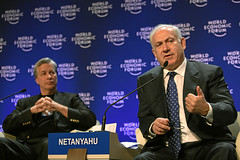 Israeli Prime Minister Benjamin Netanyahu wants a “fresh approach” to achieving peace with Palestine with a “triple track towards peace,” he said. Officials from his administration were dispatched to both Europe and the United States to pitch his plan—a three-pronged approach that includes “a political track, a security track, and an economic track.” Despite his initiative, critics think the international community will have a hard time accepting it because nowhere in the proposal is a two-state solution mentioned. In fact, Netanyahu’s administration wants to “abandon the old formulas of trading land for peace,” claiming that Iran, Hamas, and Hezbollah are Israel’s “real” problems. The absence of a stated two-state solution puts him at odds with the United States, which wants to work towards an independent Palestinian state, and at odds with Palestinian leaders who are prepared to restart talks if a two-state solution is an acknowledged goal.
Israeli Prime Minister Benjamin Netanyahu wants a “fresh approach” to achieving peace with Palestine with a “triple track towards peace,” he said. Officials from his administration were dispatched to both Europe and the United States to pitch his plan—a three-pronged approach that includes “a political track, a security track, and an economic track.” Despite his initiative, critics think the international community will have a hard time accepting it because nowhere in the proposal is a two-state solution mentioned. In fact, Netanyahu’s administration wants to “abandon the old formulas of trading land for peace,” claiming that Iran, Hamas, and Hezbollah are Israel’s “real” problems. The absence of a stated two-state solution puts him at odds with the United States, which wants to work towards an independent Palestinian state, and at odds with Palestinian leaders who are prepared to restart talks if a two-state solution is an acknowledged goal.
Political crisis has seized Nepal following Maoist Prime Minister Pushpa Kamal Dahal’s resignation from office, though a group of political parties has been called to form a new “national government.” After meeting in Kathmandu, members of the Communist UML party landed in the driver’s seat of the to-be-formed new government of Nepal, which President Ram Baran Yadav gave them five days to shape. The prime minister stepped down after Yadav opposed his decision to fire Nepal’s army chief. In response, the Maoists boycotted the “all-party meeting” and have sworn to keep parliament from functioning unless Yadav apologizes. Protests and street rallies have occurred across the country—the latest development in a process that has been worsening between the Maoist ex-rebels and the military. The Maoists want their fighters integrated into the Nepali army, but the army refused, saying that they were “politically indoctrinated.” There is no suggestion, however, that the Maoists are looking to “abandon constitutional politics”—just sit in opposition to parliament.
 The future of Africa could be increasing drought if climate change exacerbates natural weather patterns, researchers concluded. Sub-Saharan Africa is prone to have “mega-droughts” that last for extended periods—ranging from decades to centuries. As the Atlantic Ocean continues to warm as Arctic ice melts, decreasing rainfall may devastate ecological systems and kill hundreds of thousands of people. The study, published in Science magazine, surveyed soil samples from the last 3,000 years and found that a recent decades-long drought that killed tens of thousands of people could be “minor” in comparison to future events. The scientists recommended that governments begin to prepare contingency plans on irrigation and alternative water sources.
The future of Africa could be increasing drought if climate change exacerbates natural weather patterns, researchers concluded. Sub-Saharan Africa is prone to have “mega-droughts” that last for extended periods—ranging from decades to centuries. As the Atlantic Ocean continues to warm as Arctic ice melts, decreasing rainfall may devastate ecological systems and kill hundreds of thousands of people. The study, published in Science magazine, surveyed soil samples from the last 3,000 years and found that a recent decades-long drought that killed tens of thousands of people could be “minor” in comparison to future events. The scientists recommended that governments begin to prepare contingency plans on irrigation and alternative water sources.
A mutinous Georgian tank battalion has Tbilisi pointing a finger at Moscow. Describing the uprising as a part of an “abortive, nationwide coup” funded and masterminded by Russia, Georgian officials see this as the latest effort to undermine U.S.-backed President Mikhail Saakashvili and the NATO military exercises due to start in the country on Wednesday. Saakashvili called the mutiny a “serious” but isolated threat. The 500-troop battalion is located at Mukhrovoni military base, about 18 miles from Tbilisi. Thus far, the rebel unit has promised no “aggressive actions” but has refused to leave its barracks. According to the government, the base has been surrounded and negotiations have begun. Last week, Russian President Dmitry Medvedev called the NATO exercises in Georgia “an open provocation” and warned of “negative consequences.” But despite Russia’s tough talk and the suspicious timing of this mutiny, there is no sign of Russian involvement, according to Georgian Deputy Interior Minister Shota Utiashvili.
Lebanese officials arrested security officials accused of spying on Hezbollah on behalf of Israel in coordinated operations beginning on April 25, prompting chillier relations between the national government and the Shiite militia. Several past and present security and intelligence officials were arrested for relaying information about Hezbollah positions to Israeli agents—including tracking the whereabouts of leader Hassan Nasrallah—for several years before and during the 2006 war. One official said the investigations began after observers realized that while Israeli missions to capture or kill Nasrallah hadn’t succeeded, they weren’t far off the mark.